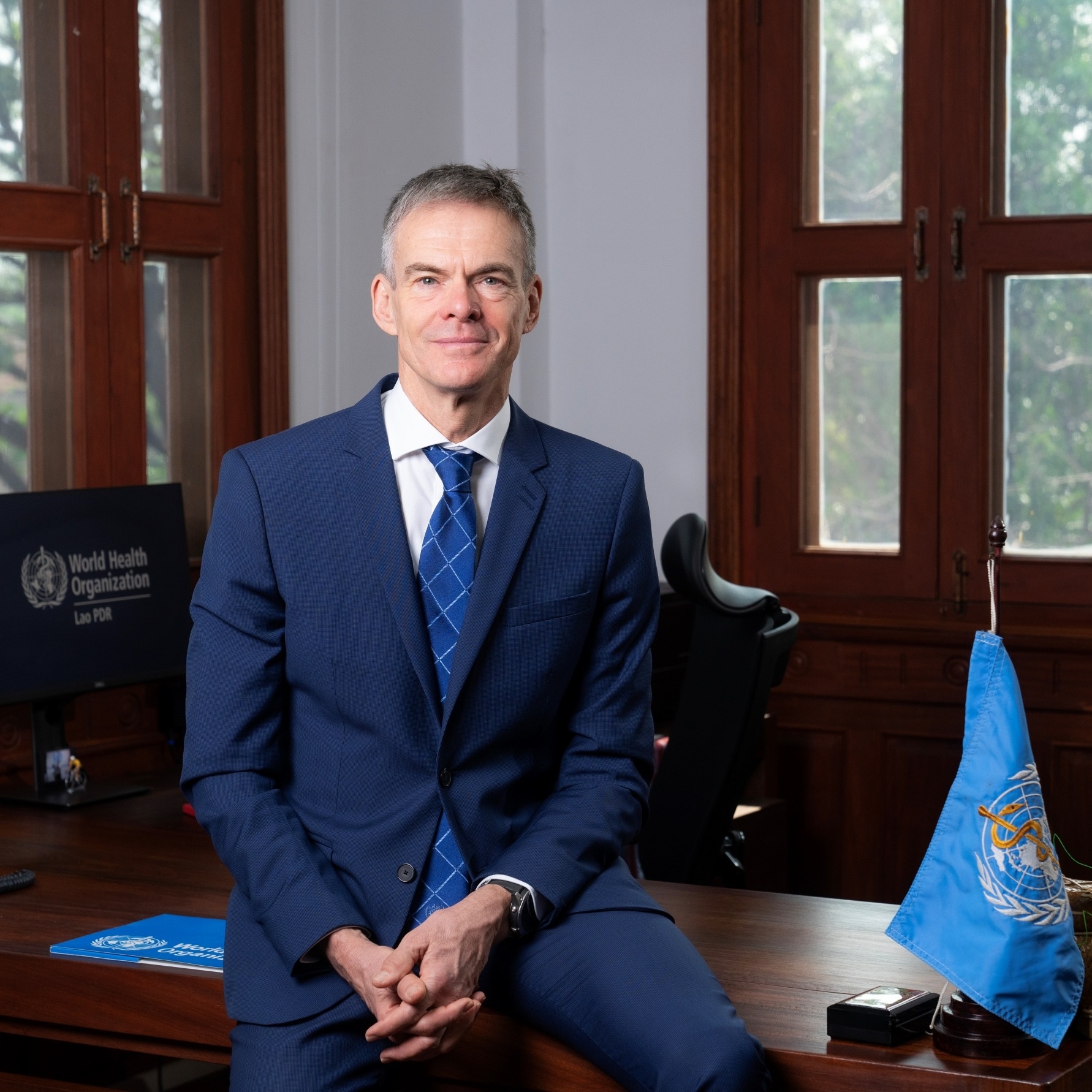
Dr Timothy Armstrong
Dr Timothy Armstrong, WHO Representative in Lao PDR
The World Health Organization (WHO) was established on 7 April 1948 with an ambitious goal – ensure the highest attainable level of health for all people.
More than 7000 WHO staff members all over the world collaborate with governments and other partners to build a healthier world. WHO operates as an independent specialized agency of the United Nations.
WHO assists countries in building
robust national health systems and in preparing for and responding to emergencies. We lead the fight against noncommunicable diseases (NCDs), such as heart disease, cancer and diabetes that cause millions of premature deaths every year.
WHO
advocates universal health coverage, safe and effective medicines, and efforts to address health inequities and the social determinants of health. We are the undisputed leader in developing global public health norms, standards and guidance.
WHO Representative to Lao People's Democratic Republic

Dr Timothy Armstrong, WHO Representative in Lao PDR
Dr Timothy Armstrong is a global health diplomacy and noncommunicable disease (NCD) expert from New South Wales, Australia, with more than 30 years of experience. Following four years working in Australia for a range of health policy-focused organizations, Dr Armstrong joined WHO in 2002, with an emphasis on NCDs.
In his 22 years with WHO, he has served in its Geneva-based headquarters as a Technical Officer (NCDs), Program Coordinator (Chronic Diseases and Health Promotion), Unit Head (Global Strategy for Diet, Physical Activity and Health), Head of Secretariat to the WHO High Level Commission on the Prevention of Childhood Obesity, and most recently, from 2015, as Director of the Department of Governing Bodies. In this latter role, he was responsible for WHO’s World Health Assembly and Executive Board, overseeing strategic engagement with WHO’s 194 Member States at the highest levels, in addition to managing other high-level WHO governance mechanisms and structures.
Across his global health diplomacy work, Dr Armstrong has guided core governance and diplomatic interfaces to strategically shape the global health agenda. He has focused on ensuring that low- and middle-income countries have a voice in global health decision-making, and supported countries to achieve consensus on technical and political issues in an increasingly complex geopolitical environment. Over the past two decades he has worked with increasing urgency to address the acceleration of climate change and environmental degradation as the greatest threats to human health.
In the field of NCDs, Dr Armstrong has been responsible for implementing NCD risk factor research in more than 50 countries, as well as supporting childhood obesity prevention and physical activity strategies across all WHO regions.
Throughout his career Dr Armstrong’s priority has remained supporting Member States. With deployments to more than 80 countries (including within Asia), he has focused on supporting the development and implementation of practical, achievable and impact-focused strategies, policies and programmes. This has cemented his belief in WHO’s mission, and the effectiveness that WHO technical support can deliver when well aligned with national priorities.
Dr Armstrong has peer-reviewed numerous publications covering genetic epidemiology, disease surveillance, health diplomacy and global health governance. He holds a PhD in Genetic Epidemiology and a Bachelor of Science with 1st Class Honours (Population Behaviour, Genetics and Social Epidemiology) from the University of New England, Australia.
Deputy WHO Representative to Lao People's Democratic Republic
Christopher
Fitzpatrick works to advance health in Lao PDR through external engagement, and
internal strategy and operations of the WHO Country Office. He contributes to
office-wide initiatives, with a focus on strengthening collaboration across
programmes and sectors.
Christopher brings
nearly 20 years of experience with WHO, including previously as a health
economist in Lao PDR, where he supported the Ministry of Health on
national health insurance and early COVID-19 response. He later served in
Uzbekistan as Health Policy Adviser, supporting primary health care reform and
resilience-building efforts in the Aral Sea region.
Christopher has
also worked at WHO headquarters in Geneva, most recently as Executive Officer
to the Assistant Director-General for Universal Health Coverage / Communicable
and Non-Communicable Diseases and Mental Health, and on secondment to the
Director-General’s Office.
He holds
postgraduate degrees in economics and finance, and a PhD in health sciences.
/countries/lao-peoples-democratic-republic/deputy-wr-_-dr-fitzpatrick.tmb-1920v.jpg?sfvrsn=47ea0e6a_2)
WHO vision and mission
The founding vision of WHO is a world in which all people attain the highest possible standard of health and well-being. The WHO mission is to promote health, keep the world safe and serve the vulnerable. WHO works with a commitment to human rights, universality and equity, based on the principles espoused in the WHO Constitution.
Core functions of WHO include: providing leadership on matters crucial to health and engaging in partnerships where joint action is needed; shaping the research agenda and stimulating the generation, translation and dissemination of valuable knowledge; setting norms and standards and promoting and monitoring their implementation; articulating ethical and evidence- based policy options; providing technical support to catalyse changes; building sustainable institutional capacity; and monitoring the health situation and assessing health trends.
In order to provide effective support, the WHO country office leverages the three levels of the Organization: to focus support where it can make a difference; to place the right people in the right places; to engage partners effectively; to enhance communications; and to improve operational intelligence.
Priorities of WHO
WHO’s general programme of work (GPW) sets medium-term priorities and strategies of the Organization. The World Health Assembly in May 2018 is expected to approve the 13th general programme of work, covering the period 2019–2023. It encompasses a set of three interconnected strategic priorities, strategic shifts and organizational shifts, as well as 10 outcomes to ensure healthy lives and promote well-being for all at all ages. The three strategic priorities are:
- Universal health coverage: 1 billion more people benefitting from universal health coverage
- Health emergencies: 1 billion more people better protected from health emergencies
- Healthier populations: 1 billion more people enjoying better health and well-being

